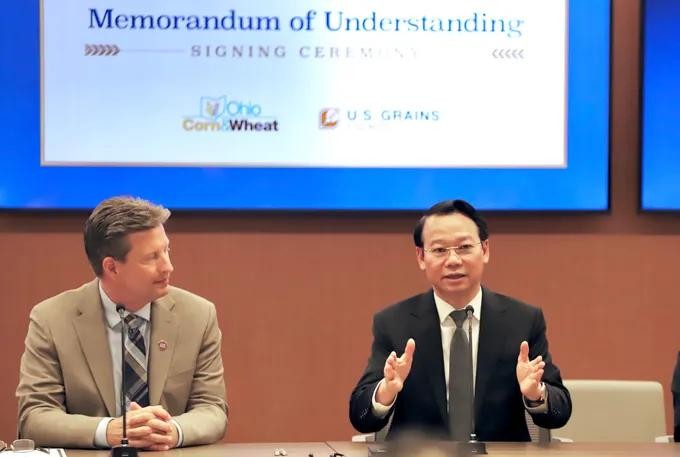Vietnamese and U.S. businesses have signed agricultural trade deals worth over US$600 million, targeting reduced reciprocal taxes and an expanded supply chain.

This morning, during his working visit to the United States, Vietnamese Minister of Agriculture and Environment Do Duc Duy held a bilateral meeting with Ohio Secretary of Agriculture Brian Baldridge. This high-level discussion is a central component of Minister Do Duc Duy's trip, aimed at boosting agricultural trade between Vietnam and the U.S.
At the meeting, both parties highlighted the significant potential for cooperation, noting that the agricultural product structures of Vietnam and the United States are complementary rather than directly competitive. Vietnam excels in tropical products like coffee, cashew nuts, fruits, pepper, and wooden furniture, while Ohio stands out in soybeans, corn, beef, milk, and raw wood products.

They agreed to propose flexible trade policies, eliminating reciprocal tariffs of up to 46 percent to stabilize the supply chain and benefit producers and consumers in both nations.
Minister Do Duc Duy stressed that balanced policies would create jobs in the U.S. while enabling Vietnam to supply high-quality agricultural products at affordable prices.
At the Vietnam-Ohio (USA) Agricultural Business Connection Forum with the participation of approximately 100 businesses from Vietnam and the US, many memorandums of understanding for importing animal feed raw materials, wood, fruit, and meat were signed with a total value exceeding $600 million.
As previously reported by SGGP, on June 2 in Iowa (USA), Vietnamese and Iowa businesses signed four memorandums of understanding for agricultural product imports valued at $800 million. Additionally, Vietnam’s Department of Livestock Production and Veterinary Medicine established a dialogue channel with the Iowa Pork Producers Association.
On June 4 and 5 (U.S. time), the Vietnam SPS Office collaborated with U.S. partner organizations to enhance transparency in food hygiene and safety standards. Both sides agreed to promote early warning technology sharing with cooperatives and farmers to minimize risks and elevate the quality of export products.
























